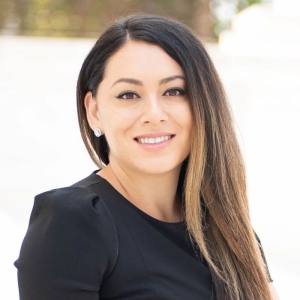Native American PhD candidate presses for understanding of tribal sovereignty by focusing on policy
November 17, 2022 / by Jacqueline Mazarella- Students
As the country celebrates National Native American Heritage Month and the U.S. Supreme Court deliberates on the future of the Indian Child Welfare Act (ICWA), Erika Salinas, PhD candidate at the USC Suzanne Dworak-Peck School of Social Work, is keeping the connection to her Native community the focus of her work.
Salinas is Comanche and Kiowa, and a member of the Comanche Nation. Growing up in Sacramento, California, her mother and father were foster parents under the ICWA, and Native foster children were often placed with their family.
“Looking back, there was definitely a loss of culture with those kids,” Salinas said. One foster child who came to live with her family had been previously adopted by a non-Native family. “He had no idea what tribe he was from,” she said. “That was eye opening to me. I was always involved with my culture and with the Native community in Sacramento.”
Protecting Native American children
ICWA was enacted in 1978 in response to a crisis affecting American Indian and Alaska Native children, families and tribes. According to the National Indian Child Welfare Association, studies revealed that large numbers of Native children were being separated from their parents, extended families and communities by state child welfare and private adoption agencies, and placed outside of their families and communities — even when fit and willing relatives were available.
The intent of Congress, written into ICWA, was to “protect the best interests of Indian children and to promote the stability and security of Indian tribes and families.” ICWA ensures that adoption decisions are made with an emphasis on placing kids with their extended families or communities when possible.
“Culture is a protective factor,” Salinas said. Studies show the positive impact of Native youth being connected to their culture, including lower mental health problems and higher academic achievement.
As an undergraduate social work student, Salinas focused her first research project on ICWA. She spoke to tribal ICWA social workers about ways to better communicate and collaborate with county agencies to improve outcomes. For her Master of Social Work (MSW), she was part of the Buder Scholars program, created for Native students and individuals interested in working with Native communities.
Through her MSW studies, Salinas realized her best chance for making a real impact was through policy change, and decided a doctoral degree would allow her the opportunity for intense study on how to improve ICWA compliance.
“When you talk about Native communities, everything revolves around policy,” she said.
Concurrent with her PhD studies, Salinas was accepted to the Udall Congressional Internship, part of The Native American Congressional Internship Program, which provides American Indian and Alaska Native students the opportunity to gain practical experience with the federal legislative process in order to understand first-hand the government-to-government relationship between Tribes and the federal government. For two summers, in 2020 and 2021, she worked with the Indian Health Services Division of Behavioral Health, gaining understanding of how policy affects tribal communities.
She saw how policy clashed with the needs of the Native communities. The requirements attached to Federal grant money restrict Tribal Nations, which operate differently to traditional nonprofits, to use it where it is most needed.
“A lot of people making decisions have never worked on the ground so it's really hard,” she said.
For her dissertation, Salinas is focusing on ICWA implementation in three ways: identifying facilitators and barriers to its implementation; critically examining Haaland v. Brackeen, the case currently before the Supreme Court, for how racialization of ICWA impacts tribal sovereignty; and exploring culturally appropriate policy implementation strategies.
“In the ongoing Supreme Court case, ICWA itself is at risk,” Salinas explained. “Which puts native children and families at risk, which also puts tribal sovereignty at risk.”
A fight that must continue
Haaland v. Brackeen is the lawsuit brought by the state of Texas (and previously Indiana and Louisiana), along with several individual plaintiffs, alleging ICWA is unconstitutional. According to the Native American Rights Fund, anti-tribal interest groups have launched a series of legal challenges, similar to the one against ICWA, with the goal of broadly undermining tribal sovereignty.
In an outpouring of support, 497 Tribal Nations, 62 Native organizations, 23 states and Washington, D.C., 87 congresspersons, 27 child welfare and adoption organizations, and others have signed on to 21 amicus briefs submitted to the U.S. Supreme Court in favor of upholding ICWA. Currently, the Supreme Court appears split in deciding the constitutionality of ICWA based on arguments that it is race-based. There is a chance that at least part of the law could be struck down.
The constant battle to keep ICWA is emotionally overwhelming, Salinas says, but it is a fight that must continue.
“It's really having to trust, even though the federal government has not always been great to Native communities, but to trust that our voices are being heard and the voices of those being impacted by ICWA are heard,” Salinas said.
Salinas believes the relationship between Tribal Nations and the U.S. government comes down to desire. “The federal government, the state government, they have to want to improve that relationship,” she said. “They’re going to have to want to reach out. They’re going to have to want to make the system work better.”
It is Salinas’ goal to help bridge this gap through her research, representation and advocacy. On behalf of all Tribal Nations, pressing for a universal understanding and acceptance of tribal sovereignty is at the heart of everything she does.
To reference the work of our faculty online, we ask that you directly quote their work where possible and attribute it to "FACULTY NAME, a professor in the USC Suzanne Dworak-Peck School of Social Work” (LINK: https://dworakpeck.usc.edu)
